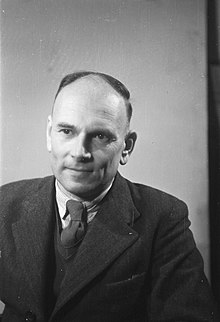Marinus van der Goes van Naters
This article needs additional citations for verification. (March 2022) |
Marinus van der Goes van Naters | |
|---|---|
 Marinus van der Goes van Naters in 1946 | |
| Member of the European Parliament | |
| In office 1 January 1958 – 7 May 1967 | |
| Parliamentary group | Socialist Group |
| Constituency | Netherlands |
| Member of the European Coal and Steel Community Parliament | |
| In office 10 September 1952 – 1 January 1958 | |
| Parliamentary group | Socialist Group |
| Constituency | Netherlands |
| Parliamentary leader in the House of Representatives | |
| In office 4 June 1946 – 16 January 1951 | |
| Preceded by | Office established |
| Succeeded by | Jaap Burger |
| Parliamentary group | Labour Party |
| In office 25 September 1945 – 4 June 1946 | |
| Preceded by | Willem Drees |
| Succeeded by | Office discontinued |
| Parliamentary group | Social Democratic Workers' Party |
| Member of the House of Representatives | |
| In office 4 June 1946 – 22 February 1967 | |
| Parliamentary group | Labour Party |
| In office 8 June 1937 – 4 June 1946 | |
| Parliamentary group | Social Democratic Workers' Party |
| Personal details | |
| Born | Marinus van der Goes van Naters 21 December 1900 Nijmegen, Netherlands |
| Died | 12 February 2005 (aged 104) Wassenaar, Netherlands |
| Political party | Labour Party (from 1946) |
| Other political affiliations | Social Democratic Workers' Party (until 1946) |
| Spouse |
Anneke van der Plaats
(m. 1924; died 1985) |
| Children | 5 |
| Alma mater | Leiden University (LLB, LLM, PhD) |
| Occupation |
|
Jonkheer Marinus van der Goes van Naters (21 December 1900 – 12 February 2005) was a Dutch politician of the defunct Social Democratic Workers' Party (SDAP) and later the Labour Party (PvdA) and lawyer.[1]
Background and early career[edit]
He was born in Nijmegen. He was a member of the House of Representatives from 1937 to 1967 and in-parliament chairman of the Social Democratic parties SDAP and its successor the Dutch Labour Party from 1945 to 1951.[citation needed]
Imprisonment at Buchenwald and elsewhere[edit]
From 1940 to 1944 during World War II he was held hostage by the German occupiers in various camps, including Buchenwald concentration camp.[citation needed]
German border issues after WW2[edit]
In the mid-1950s he was involved in the eponymous plan adopted by the Council of Europe for the settlement of the Saar question. In the post-war years he successfully argued that the Duivelsberg (German: Wylerberg or Teufelsberg), annexed from Germany after World War II, be retained permanently by the Netherlands.[citation needed]
Death[edit]
He died in 2005 at the age of 104 in Wassenaar, Netherlands.[citation needed]
Decorations[edit]
| Honours | ||||
| Ribbon bar | Honour | Country | Date | Comment |
|---|---|---|---|---|
| Knight of the Order of the Netherlands Lion | Netherlands | 30 April 1951 | ||
| Commander of the Order of Orange-Nassau | Netherlands | 22 February 1967 | ||
See also[edit]
References[edit]
- ^ "Goes van Naters, jhr. Marinus van der (1900-2005)" (in Dutch). Huygens ING. 12 November 2013. Retrieved 19 March 2019.
External links[edit]
- Official
- (in Dutch) Jhr.Mr.Dr. M. (Marinus) van der Goes van Naters Parlement & Politiek
- 1900 births
- 2005 deaths
- Buchenwald concentration camp survivors
- Commanders of the Order of Orange-Nassau
- Dutch centenarians
- Dutch conservationists
- Dutch expatriates in Rwanda
- Dutch jurists
- Dutch legal scholars
- Dutch legal writers
- Dutch members of the Dutch Reformed Church
- Dutch nature writers
- Dutch people of World War II
- Dutch political activists
- Dutch political writers
- Dutch political party founders
- Dutch prisoners of war in World War II
- Jonkheers of the Netherlands
- Knights of the Order of the Netherlands Lion
- Labour Party (Netherlands) MEPs
- Labour Party (Netherlands) politicians
- Leiden University alumni
- Members of the House of Representatives (Netherlands)
- MEPs for the Netherlands 1958–1979
- World War II prisoners of war held by Germany
- World War II civilian prisoners
- People from Heerlen
- People from Nijmegen
- Protestant Church Christians from the Netherlands
- Social Democratic Workers' Party (Netherlands) politicians
- Academic staff of the University of Rwanda
- 20th-century Dutch educators
- 20th-century Dutch lawyers
- 20th-century Dutch male writers
- 20th-century Dutch politicians
- Men centenarians
- Labour Party (Netherlands) politician stubs
- Dutch MEP stubs
